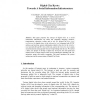76 search results - page 6 / 16 » Implicit Culture for Information Agents |
IDEAL
2004
Springer
14 years 1 months ago
2004
Springer
Proteins are known to perform a biological function by interacting with other proteins or compounds. Since protein–protein interaction is intrinsic to most cellular processes, pr...
ITCC
2005
IEEE
14 years 1 months ago
2005
IEEE
Developing large multi-agent systems is a complex task involving the processes of the requirement, architecture, design and implementation of these systems. In particular, the arc...
CIA
1999
Springer
13 years 12 months ago
1999
Springer
This paper proposes the concept of digital cities as a social information infrastructure for urban life (including shopping, business, transportation, education, welfare and so on)...
AAAI
2007
13 years 10 months ago
2007
This paper reports on our recent work on modeling and automatically extracting vague, implicit event durations from text (Pan et al., 2006a, 2006b). It is a kind of commonsense kn...
MM
2004
ACM
14 years 1 months ago
2004
ACM
In this article, we present the Association Engine, a multimedia installation that explores the space of language and exposes connections between words. It externalizes meaningful...

